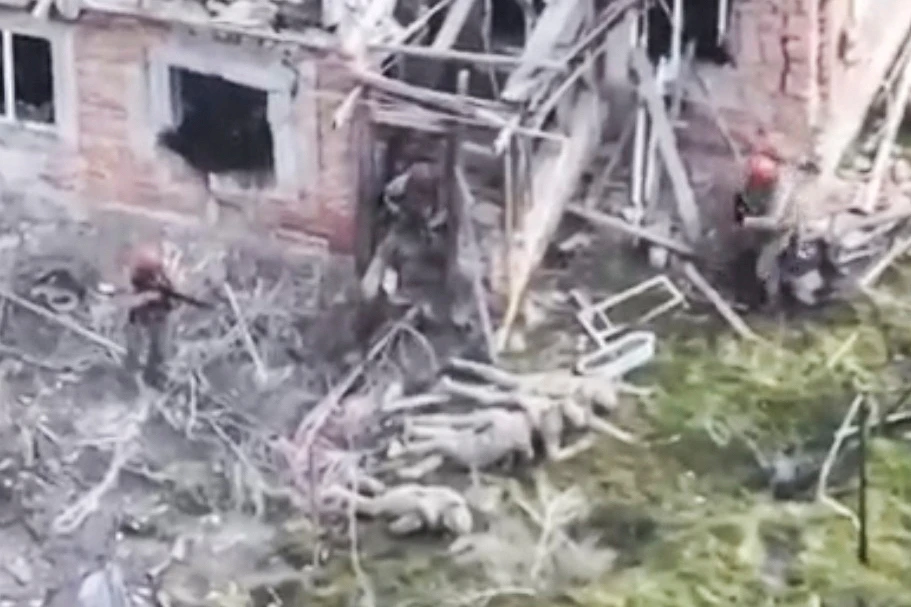In a harrowing development that underscores the intensifying brutality of the war in Ukraine, two separate drone videos obtained by the Associated Press appear to document the execution of Ukrainian prisoners of war (POWs) by Russian troops. The disturbing footage has ignited renewed global concern over accountability and violations of international humanitarian law, as calls mount for justice amid Russia’s ongoing invasion.

The videos — one recorded by a Ukrainian military drone, the other by a Russian drone — capture the same scene from contrasting angles and with vastly different narrative implications. Together, they paint a chilling picture of apparent war crimes, prompting sharp condemnation from international observers, human rights agencies, and war crimes prosecutors.
The Ukrainian drone footage was reportedly captured by the 128th Mountain Brigade near the war-torn village of Piatykhatky in southern Ukraine on March 13. The AP received the video from European defense officials who were granted access by Ukrainian authorities. These officials requested anonymity, citing lack of authorization to speak publicly.
The graphic clip shows four Ukrainian soldiers, clearly having surrendered, lying face-down on the ground. After a brief inspection, one man in Russian uniform casually approaches and opens fire on the defenseless prisoners. Another soldier joins in, firing multiple rounds before stopping to reload. A third executes at least two close-range shots, one of which visibly severs a soldier’s helmet — and likely his head. The initial shooter then returns to methodically finish off each victim.
Experts reviewing the footage note the complete absence of combat activity at the moment of the killings — strongly suggesting this was a deliberate act of extrajudicial execution.
In sharp contrast, the Russian drone video — discovered by the AP on pro-Kremlin social media — appears to be part of a controlled narrative. Set to haunting music, it depicts the same group of Russian troops as they corral the surrendering Ukrainians from a collapsed structure at gunpoint. However, the video cuts out just after the prisoners lie down on the ground — before any shots are fired.
Analysts say this editing tactic is consistent with past Russian disinformation efforts aimed at manipulating perceptions of battlefield incidents.
The implications of these videos are severe. Under international law, the summary execution of prisoners of war constitutes a war crime. Danielle Bell, who leads the United Nations Human Rights Monitoring Mission in Ukraine, confirmed her office has seen a sharp increase in such atrocities.
“We’ve documented a startling spike in the number of executions of captured Ukrainian service persons,” Bell stated. She cited dehumanizing rhetoric and impunity encouraged by high-ranking Russian officials as fueling this surge.
Ukrainian prosecutors report that since Russia’s full-scale invasion in 2022, at least 245 Ukrainian POWs have been executed by Russian forces. Yurii Bielousov, head of Ukraine’s war crimes unit, emphasized that such actions are not isolated incidents but part of an entrenched policy “fully supported by the top leaders of the Russian Federation.”
From August 2024 alone, the UN has documented 91 extrajudicial killings of Ukrainian POWs — while only one confirmed instance involved Ukrainian forces killing a Russian prisoner.
Ukraine’s 128th Mountain Brigade has refrained from commenting, citing an ongoing criminal investigation by Ukraine’s internal security agency. Meanwhile, Russia’s Ministry of Defense has remained silent on the footage, declining requests for comment.
Kremlin spokesperson Dmitry Peskov has continued to assert that Russia treats captured Ukrainian troops “in accordance with international law,” despite mounting evidence to the contrary.
A report from Russia’s Foreign Ministry in March attempted to turn the tables, accusing Ukrainian forces of systematically killing Russian POWs — but failed to provide substantive data or corroborating evidence.
The potential for holding Russian leadership accountable through international legal channels faces a major hurdle: shifting U.S. foreign policy. The Trump administration has distanced itself from efforts to form a multinational war crimes tribunal targeting Russia’s top brass. It has also withdrawn support from the International Criminal Court (ICC), which has issued an arrest warrant for Russian President Vladimir Putin.
Cuts in U.S. aid have weakened evidence-collection efforts and delayed judicial preparation by groups working with Ukrainian prosecutors. Legal experts warn that without U.S. backing, the likelihood of prosecuting Russian war crimes diminishes considerably.
Former U.S. war crimes ambassador Stephen Rapp criticized the lack of international unity. “Accountability is at risk,” he said, stressing that such blatant war crimes must not go unanswered.
Despite geopolitical headwinds, Ukraine insists that justice must prevail. President Volodymyr Zelenskyy has reiterated that any future peace negotiations must include provisions for war crimes accountability.
Bielousov echoed that sentiment: “We are not ready to forgive everything which happened in our territory. Justice is not optional — it’s essential.”



